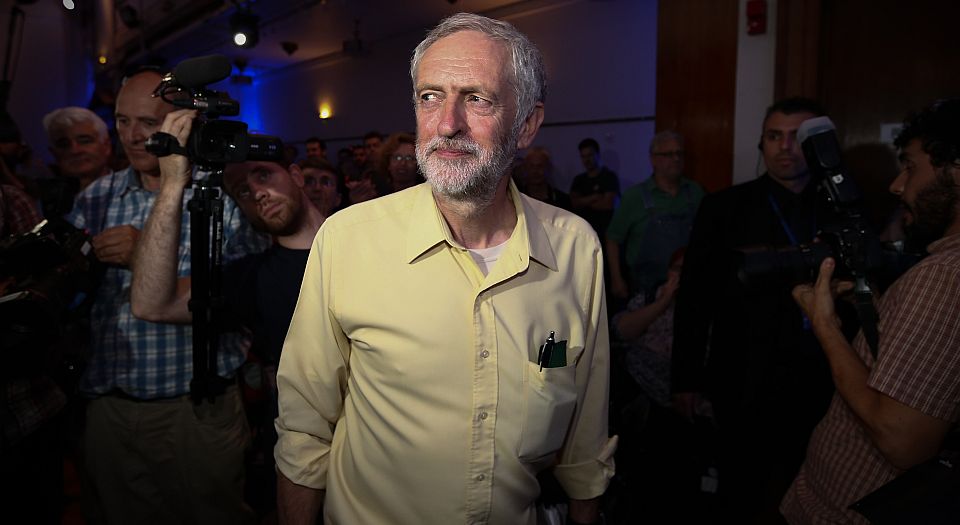War on Corbyn: the Tyranny of the Moderates
Anti-Corbynism speaks to the anti-democratic drabness of our era.

Want unlimited, ad-free access? Become a spiked supporter.
There’s a dark, twisted irony to the anti-Corbyn lobby’s claim that Jeremy Corbyn is destroying the Labour Party. Which is that these bitter Blairites, Labour moderates, right-leaning commentators and others who come out in hives at the mere sight of Corbyn’s countenance are a far greater threat to the health and future of Labour than Corbyn could ever be. In fact, it has become clear in recent weeks that Corbyn’s loathers aren’t only polluting Labour with their infighting, backstabbing and incessant bitching about Corbyn; they threaten to undermine the exercise of open, free politics in Britain more broadly.
As we at spiked have made clear many times, we’re no fans of Corbyn. His illiberal, state-reliant worldview, with its eco-friendly disdain for large economic growth and its authoritarian-friendly distrust of ordinary people’s capacity to govern their lives, is about as far from spiked’s radical humanism as you can get. In normal circumstances, we’d be publishing loads of critiques of what is fancifully termed ‘Corbynism’. But things aren’t normal. For there’s another political trend, or political revulsion, that is having a far more warping impact on the democratic sphere than Corbyn, and which demands the critical attention of all progressives.
That trend, that revulsion, is CounterCorbynism. This outlook has gripped significant sections of the chattering class. It’s generating mad claims that Corbyn is a threat to national security. It has led to explicit demands for Labour insiders to organise a coup to elbow aside the man who was elected leader just three months ago. It has given rise to shrill claims that Corbynites are organising mass trolling of Labour MPs who defied their leader and voted for British bombing in Syria, and to chilling demands that online political debate be more closely monitored. It informs the headline-seeking sniping of leading Labour lights like Chuka Umunna and Tristram Hunt, who now try to do through media gossip what they spectacularly failed to do through Labour’s internal democracy: challenge Corbyn, and beat him.
Whatever you think of Corbyn, his secular-vicar act and his old-fashioned views, it should be clear that on every political level his Labour opponents are worse. On these three levels in particular:
Democracy: Corbyn was elected leader of Labour. Convincingly. We can analyse all day long why this strange thing happened – spiked’s view is that it was less a Lazarus-style return to life of Old Labour and more a sign that the party is now so hollow that any old cabal can take it over – but the fact is it happened. What does it do to Labour, to the very basis of the party, when those who lost the leadership election, or who refused to stand because a journalist knocked on their mum’s door (Umunna), now conspire to overturn the party’s democratic will?
The bitter Blairites are unabashed in their cries for Corbyn to be overthrown with sub-Shakespearean skulduggery. We need some ‘backstabbing bastards’ to ‘[override] party democracy’, says one Labourite columnist. Tony Blair’s former adviser John McTernan has argued that the Labour machine should put ‘the interests of Labour voters before Labour members’ and get rid of Corbyn – a brilliantly Orwellian marshalling of democratic claims to undermine party democracy. What this aloof plotting says is that Labour’s members don’t matter. In fact, they’re a problem, a block to the ‘right thing’ Labour should be doing, as decided by unelected commentators and Blairite bureaucrats. This calling into question of the value of party democracy damages Labour infinitely more than Corbyn does. It dents the very idea of people choosing their leaders.
Freedom of speech: Politics isn’t worth a damn without freedom of speech and debate – including testy, frank debate. The anti-Corbyn mob is undermining such freedom. After the Commons vote on bombing Syria, the Corbyn-allergic sections of the commentariat and political elite started a Mary Whitehouse-style moral panic about ‘trolling’ by Corbyn fanboys, by which they mainly meant anti-war members of the public saying angry or vile things to their pro-war MPs. The stupid mob: don’t they know the role of the plebs is to nod along with their rulers, or at most write a polite protest letter?
The trolling scare was utterly overblown. Things were made up. Tory MP Lucy Allan lied about receiving an email from a constituent who said he wanted her to die, and the reports that anti-war protesters had gathered at the home of pro-bombing Labour MP Stella Creasy were false. (Strikingly, it took Ms Creasy more than 24 hours to correct these phoney claims – not surprising, considering she’s built her entire political career on the conceit that she’s the poor victim of the trolling mob.)
Soon there were demands for Labour to purge anyone who had ‘trolled’ – ie, said furious things – and Labour insiders said the party would draw up a code of conduct to protect ‘moderate MPs’ from the words of immoderate lefties. Thus does anti-Corbynism aim to chill the free flow of ideas, discussion and ridicule. We should always be very suspicious when powerful politicians pose as victims of the public, the mob, and propose measures to curb the mob’s speech. Like those 18th-century MPs who would faint upon sight of a shouting ‘ordinary person’, anti-Corbynites scaremonger about free debate and legitimise the demonisation of those who use the web to rail against their rulers.
Independent campaigning: A key part of politics is the existence of campaign groups that use argument and protest to put their point across. The anti-Corbyn lobby’s attempts to destroy the Stop the War campaign suggests it has a problem with this, too.
spiked disagrees with Stop the War on just about everything. Our view is that its politics are an expression of moral cowardice, a risk-dodging, lefty version of Little Englandism, dolled up as anti-imperialism. Nonetheless, the borderline McCarthyite war on Stop the War by anti-Corbynites is far worse than anything STW has said or done. The bitter Blairites and others demand that Corbyn leave and publicly denounce STW. They tried to stop him from attending its Christmas party (to his credit, he went and made a pretty defiant speech). They treat STW as Reds under the Bed, destroying Labour’s reputation and sullying British decency. How long before everyone who enters politics is asked, ‘Are you now or have you ever been a member of Stop the War?’. It’s nasty and intolerant.
Corbyn has said some daft things in the past three months. But none of them holds a candle to the anti-democratic, fear-fuelled, illiberal antics of those who are so desperate to make Labour get rid of Corbyn that they seem not to mind if they destroy Labour in the process.
The bigger story here is of Third Way intolerance. Corbyn is loathed for the same reason as another party leader, whom he won’t like being compared with: UKIP frontman Nigel Farage. The intensity of the media and chattering-class distaste for Corbyn and Farage is fuelled by the 21st-century instinct to keep politics firmly in the middle, free from passion and fury, cleansed of strong feelings and firm views. Corbyn, of course, is hardly a firebrand; indeed, it is testament to the savage shrinking of the political sphere in recent years that even this rather timid purveyor of standard state-socialist ideas can become the object of so much angst. Even his slightly off-centre worldview cannot be tolerated in an era when to be ideological is a crime, to argue is to be a ‘troll’, and to say anything mildly critical of environmentalism, multiculturalism or any of the other Third Way isms designed to keep society peaceably ticking along is to be an extremist.
We’re living under what might seem like a contradiction in terms: a Tyranny of the Moderates. An Observer columnist, becoming the latest self-important hack to announce that she was flouncing out of Corbyn-led Labour, said she was furious that the word ‘moderate’ has ‘become an insult’. Which goes to show how historically clueless today’s commentariat is. Until the dawn of our dull, ideology-free, painfully middle-class political era about 20 years ago, ‘moderate’ was long used as a slur. Even Aneurin Bevan complained about ‘people who stay in the middle of the road’ – ‘they get run down’. The reimagination of politics as managerialism, as a passionless arena in which all we hear are varying but always moderate ideas for how to keep a lid on economic problems and manage people’s behaviour, is a recent thing. And now it is intensively enforced and policed.
We’re back to that dark, twisted irony: in the name of keeping politics sedate, the moderates use fear, panic and anti-democratic agitation to shush anyone who deviates from their drab script. They hate fury in politics, so they furiously punish anyone who practises it. They crush dissent to maintain niceness. They lie about trolling to expose trolls who lie. They use extreme methods – calls to suspend party democracy and to involve the police in online debate – to tackle extremism. All these ironies would be funny if the consequences were not potentially so severe.
Brendan O’Neill is editor of spiked.
£1 a month for 3 months
You’ve hit your monthly free article limit.
Support spiked and get unlimited access.
Support spiked – £1 a month for 3 months
spiked is funded by readers like you. Only 0.1% of regular readers currently support us. If just 1% did, we could grow our team and step up the fight for free speech and democracy.
Become a spiked supporter and enjoy unlimited, ad-free access, bonus content and exclusive events – while helping to keep independent journalism alive.
———————————————————————————————————————————–
Exclusive January offer: join today for £1 a month for 3 months. Then £5 a month, cancel anytime.
———————————————————————————————————————————–
Monthly support makes the biggest difference. Thank you.











Comments
Want to join the conversation?
Only spiked supporters and patrons, who donate regularly to us, can comment on our articles.